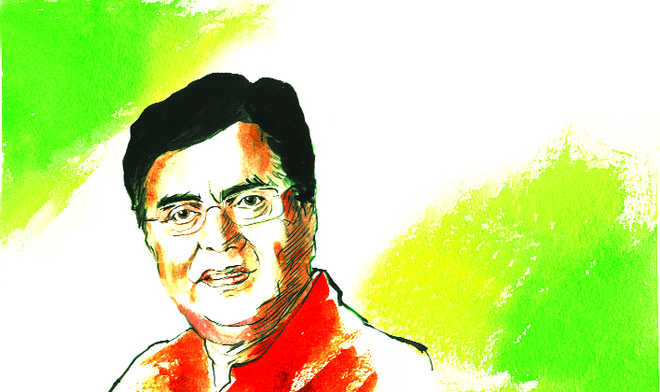Ek bauchhar tha wo shakhs bina barse
Kisi abra ki sahami si nami se jo bhigo deta tha
(That man was like a torrent and even without raining
He could soak you completely only with the shy mist of a cloud)
— Gulzar on Jagjit Singh
His was a voice from the heavens. To the heavens it has been confined. Surely, it must be regaling the heavens with all its mellifluousness. October 10 would mark four years since the passing away of Jagjit Singh. For those whose lives he touched and continues to do so, he has embraced immortality.
His “melancholy strain” was indeed the “bliss of solitude”. He could take melancholy to new depths or elevate it to such heights to give it spiritual connotations. He was no charaagar or the quintessential healer that finds mention in Urdu poetry; Jagjit would symphonise human pain and suffering to the tune of his compositions. And that way cast a magical spell.
Bracketing him as a singer who eulogised suffering would be grossly unfair. Described by poet Gulzar as “Ghazaljit” because of the new verve he gave to the rendition of this genre, there was much more to the iconic singer. He was equally at ease rendering Gurbani or bhajans, and held an easy and admirable sway over semi-classical and classical renditions.
Ghazal, which historically echoed in the courts of Delhi and Lucknow, was made popular by the likes of Begum Akhtar, who belonged to the traditional school of ghazal singing. The appreciation of the form was restricted to the echelons of society who could decipher the verbosity of Urdu diction and had rudimentary knowledge of classical music. It was when Jagjit’s star rose on the ghazal firmament that such fetters were broken. He deliberately chose simple lyrics, went beyond the use of traditional musical instruments, and yet kept the soul of this sensitive poetic form intact.
Indeed, the man with the velvety voice is rightly credited with making the genre of ghazal sumptuously edible to a whole new generation.
In an era where even people from creative fraternities leave no stone unturned to please the powers-that-be, Jagjit conducted himself in an exemplary manner. I recall when his arrival on the stage in Patiala once was preceded by the performances of two singers. Both prostrated before high-ups and set new standards of sycophancy. Jagjit merely acknowledged their presence and put forth a demand for a worthy auditorium in the city for such events. Eventually, in successive years, his demand did see the light of day.
The test of a good singer lies in live concerts, beyond the four walls of recording studios, without any technical support. And this is where Jagjit Singh excelled to the core. His amazing connect with the audience would take them deep down the dungeons of melancholy with his soulful renditions, and the next moment take them out with humorous Punjabi folk sequences.
He would decode the otherwise difficult couplets so the audience could appreciate the finer nuances of Urdu poetry. In between would be sprinkled anecdotes and jokes to lift the mood. He was among the rare breed of singers who had the uncanny ability of making the imagery come alive with their singing. As he sang Sudarshan Faakir’s nostalgic nazm ‘Kagaz ki kashti’, you would involuntarily find yourself wandering in the alleys of childhood.
As he sang the 10th Sikh Master’s composition ‘Mitar pyaare nu’, he evoked pathos. The lament of the last Nawab of Awadh, Wajid Ali Shah, over his exile from his favourite Lucknow expressed soulfully in his composition ‘Babul mora naihar’ and sung by the icon impinges upon you to share Wajid Ali Shah’s distress.
It would be a formidable task to choose the best work of the singer-composer, yet if only one had to be picked, many would opt for Jagjit Singh’s compositions of Mirza Ghalib, brought alive on screen by Naseeruddin Shah. The magic weaved by the poetry of Ghalib, the voice of Jagjit and Naseer’s acting resulted in a synergy with few parallels.
That is not to say that albums like Sajda with Lata Mangeshkar and Birha Da Sultan based on Shiv Batalvi’s poetry were lesser achievements. Jagjit Singh, the man with the velvety voice, has indeed embraced immortality. What a loss to us, earthly mortals, and what a gain for the denizens of heaven.
The writer is a Patiala-based freelance contributor
Unlock Exclusive Insights with The Tribune Premium
Take your experience further with Premium access.
Thought-provoking Opinions, Expert Analysis, In-depth Insights and other Member Only Benefits
Already a Member? Sign In Now










